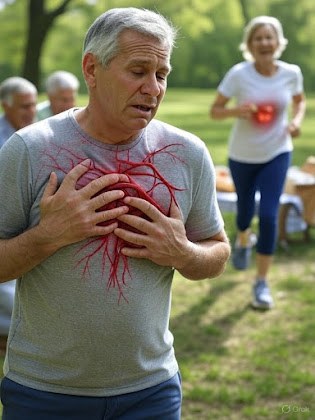I believe you meant "heart attack" instead of "heart attach." Here's a concise overview of the causes and prevention of a heart attack (myocardial infarction):
### Causes of a Heart Attack
A heart attack occurs when blood flow to a part of the heart is blocked, often due to:
1. **Coronary Artery Disease (CAD):** The most common cause, where plaque (cholesterol and other substances) builds up in the coronary arteries, narrowing them and reducing blood flow.
2. **Blood Clot:** A clot can form on a plaque rupture, completely blocking the artery.
3. **Spasm of a Coronary Artery:** A sudden tightening of the artery can restrict blood flow, often linked to stress, smoking, or drug use (e.g., cocaine).
4. **Risk Factors:**
- High cholesterol or triglycerides
- High blood pressure (hypertension)
- Smoking or tobacco use
- Diabetes
- Obesity or sedentary lifestyle
- Family history of heart disease
- Age (risk increases for men over 45 and women over 55)
- Stress and unhealthy diet (high in saturated fats, trans fats, and sodium)
### Prevention of a Heart Attack
1. **Healthy Diet:**
- Eat more fruits, vegetables, whole grains, and lean proteins.
- Limit saturated fats, trans fats, cholesterol, sodium, and added sugars.
- Include heart-healthy fats like those from nuts, seeds, and fish (rich in omega-3s).
2. **Regular Exercise:**
- Aim for at least 150 minutes of moderate aerobic activity (like brisk walking) or 75 minutes of vigorous activity (like running) per week, plus muscle-strengthening exercises twice a week.
3. **Maintain a Healthy Weight:**
- Keep your body mass index (BMI) in the healthy range (18.5–24.9). Losing even 5-10% of body weight if overweight can help.
4. **Quit Smoking:**
- Smoking damages blood vessels and increases plaque buildup. Quitting can significantly lower your risk within a year.
5. **Manage Stress:**
- Practice relaxation techniques like meditation, yoga, or deep breathing to reduce stress hormones that strain the heart.
6. **Control Medical Conditions:**
- Manage blood pressure (aim for <120/80 mmHg), cholesterol (LDL <100 mg/dL), and blood sugar (HbA1c <7% for diabetics) through diet, exercise, and medications if prescribed.
- Take medications as directed, such as statins for cholesterol or aspirin for clot prevention (consult a doctor first).
7. **Limit Alcohol:**
- Drink in moderation—up to one drink per day for women and two for men.
8. **Regular Checkups:**
- Monitor your heart health with regular doctor visits, especially if you have risk factors. Tests like ECGs, stress tests, or lipid profiles can help detect issues early.
### Additional Notes
- **Know the Symptoms:** Chest pain, shortness of breath, nausea, sweating, or pain radiating to the arm, jaw, or back. Women may experience atypical symptoms like fatigue or indigestion.
- **Act Fast:** If you suspect a heart attack, call emergency services immediately (e.g., 108 in India). Quick treatment can save lives.
Adopting these lifestyle changes can significantly reduce your risk of a heart attack.





















No comments:
Post a Comment